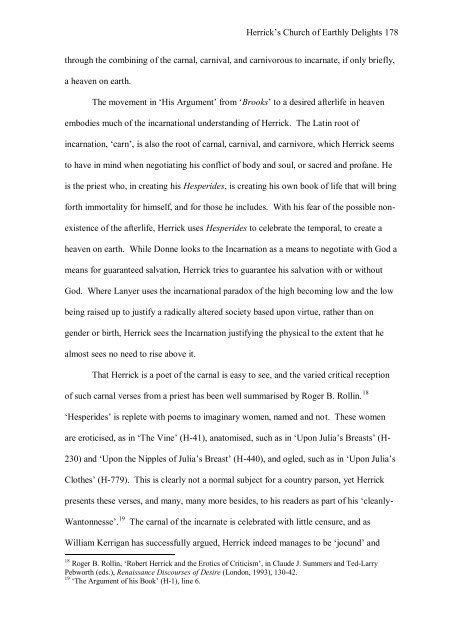Jesse Sharpe PhD thesis - Research@StAndrews:FullText ...
Jesse Sharpe PhD thesis - Research@StAndrews:FullText ...
Jesse Sharpe PhD thesis - Research@StAndrews:FullText ...
You also want an ePaper? Increase the reach of your titles
YUMPU automatically turns print PDFs into web optimized ePapers that Google loves.
Herrick’s Church of Earthly Delights 178<br />
through the combining of the carnal, carnival, and carnivorous to incarnate, if only briefly,<br />
a heaven on earth.<br />
The movement in ‘His Argument’ from ‘Brooks’ to a desired afterlife in heaven<br />
embodies much of the incarnational understanding of Herrick. The Latin root of<br />
incarnation, ‘carn’, is also the root of carnal, carnival, and carnivore, which Herrick seems<br />
to have in mind when negotiating his conflict of body and soul, or sacred and profane. He<br />
is the priest who, in creating his Hesperides, is creating his own book of life that will bring<br />
forth immortality for himself, and for those he includes. With his fear of the possible nonexistence<br />
of the afterlife, Herrick uses Hesperides to celebrate the temporal, to create a<br />
heaven on earth. While Donne looks to the Incarnation as a means to negotiate with God a<br />
means for guaranteed salvation, Herrick tries to guarantee his salvation with or without<br />
God. Where Lanyer uses the incarnational paradox of the high becoming low and the low<br />
being raised up to justify a radically altered society based upon virtue, rather than on<br />
gender or birth, Herrick sees the Incarnation justifying the physical to the extent that he<br />
almost sees no need to rise above it.<br />
That Herrick is a poet of the carnal is easy to see, and the varied critical reception<br />
of such carnal verses from a priest has been well summarised by Roger B. Rollin. 18<br />
‘Hesperides’ is replete with poems to imaginary women, named and not. These women<br />
are eroticised, as in ‘The Vine’ (H-41), anatomised, such as in ‘Upon Julia’s Breasts’ (H-<br />
230) and ‘Upon the Nipples of Julia’s Breast’ (H-440), and ogled, such as in ‘Upon Julia’s<br />
Clothes’ (H-779). This is clearly not a normal subject for a country parson, yet Herrick<br />
presents these verses, and many, many more besides, to his readers as part of his ‘cleanly-<br />
Wantonnesse’. 19<br />
The carnal of the incarnate is celebrated with little censure, and as<br />
William Kerrigan has successfully argued, Herrick indeed manages to be ‘jocund’ and<br />
18 Roger B. Rollin, ‘Robert Herrick and the Erotics of Criticism’, in Claude J. Summers and Ted-Larry<br />
Pebworth (eds.), Renaissance Discourses of Desire (London, 1993), 130-42.<br />
19 ‘The Argument of his Book’ (H-1), line 6.
















